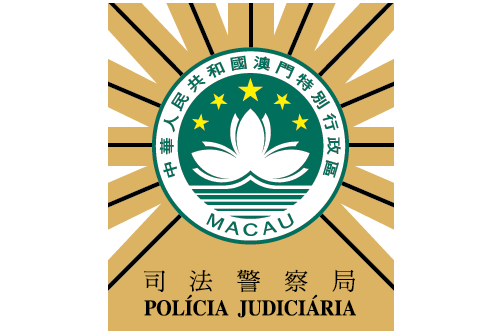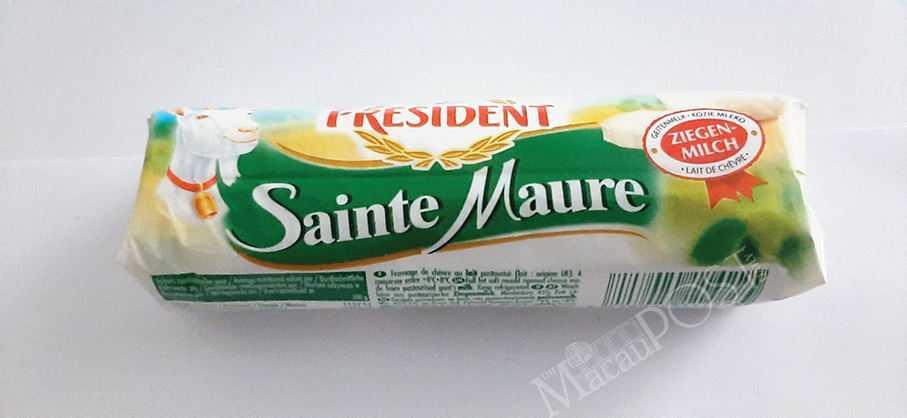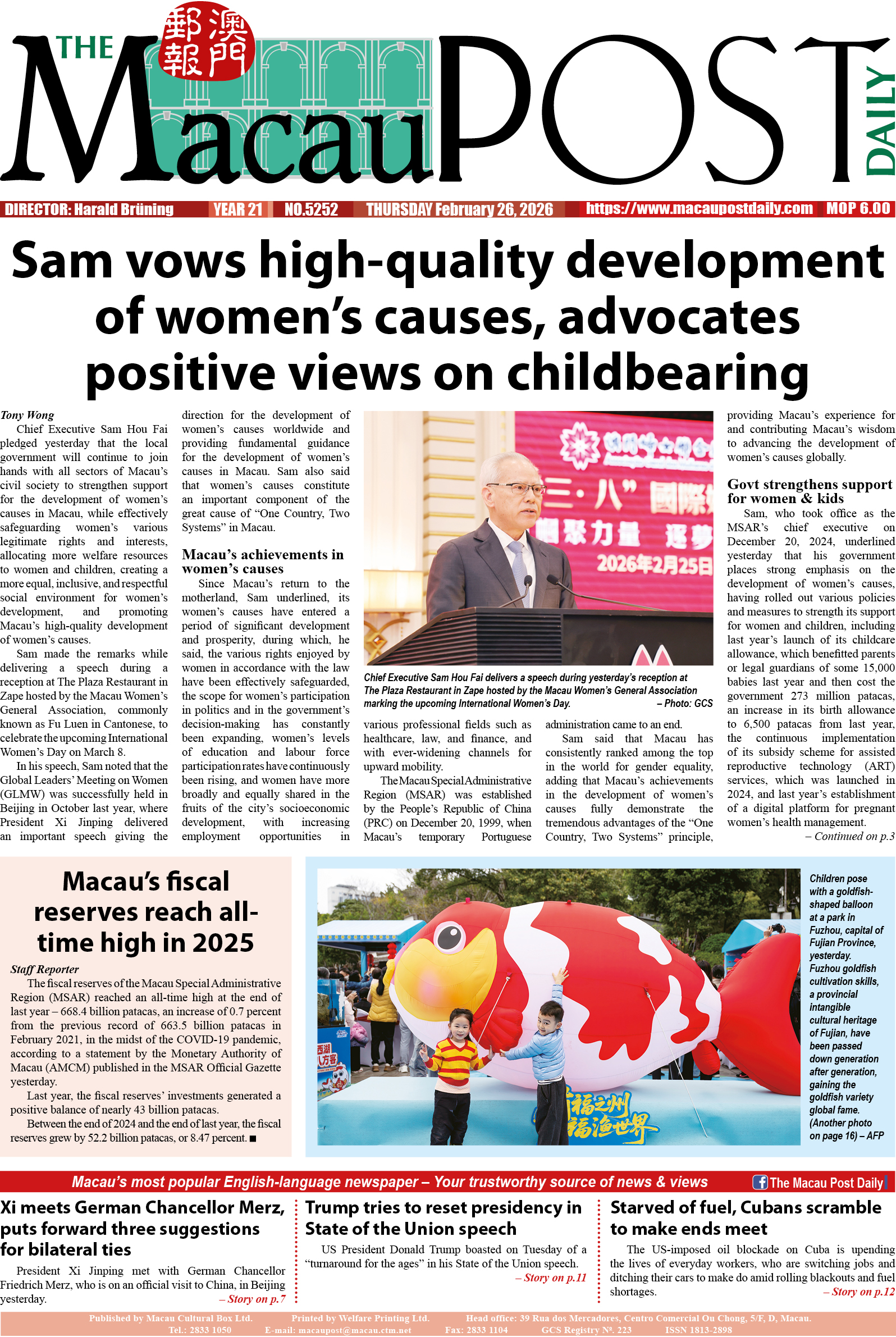Editorial
The current public consultation exercise on the government’s proposed amendments to Macau’s two-decade-old gaming law is not only an important matter of local but also of national interest. Obviously, the aim of the revision must be to improve the government’s checks and oversight of our city’s gaming sector and to enable our casino operators to use their business acumen in a strictly regulated way that both benefits their companies and the Macau Special Administrative Region (MSAR).
No small feat indeed – for either side.
When the 45-day public consultation commenced with a meeting hosted by the government and attended by representatives of gaming and junket operators earlier this month, some of the latter requested more information on the proposed overhaul. Gaming Inspection and Coordination Bureau (DICJ) Director Adriano Marques Ho listened to the suggestions but played the government’s cards close to his chest. Well, that’s understandable as the chief of the gaming inspectorate is not a policy maker but a civil servant. The operators’ requests for more information on the upcoming changes that will deeply affect them is comprehensible as well.
However, we have to bear in mind that Macau’s gaming operators are concessionaires (or subconcessionaires), not licensees. A concession is a kind of partnership between the government and the private sector. Concessions are complex arrangements that give the granter considerable leeway over how the concessionaires can run their business. Macau’s water and power utilities are, for instance, concessions granted by government, whereas licences are nothing more than business authorisations granted by the government within a certain regulatory framework, such as for banks or pharmacies.
That’s why Macau’s casino businesses are kept on a rather tight rein by the government. The challenge for the government is how tight a rein it should keep on the gaming sector so that it still benefits both sides – the granter (rider) and the concessionaire (horse) in Macau’s case. As someone who grew up in an equestrian family, I know from my own experience that for a rider to keep a horse on comfortable reins – comfortable for both – is quite a challenge. Gripping the reins too tight or holding them too loosely can be equally counterproductive.
That’s why it is of utmost importance for the government when it is preparing its supervisory overhaul of the sector to strike the right balance between its regulatory oversight and the operators’ leeway to develop their businesses.
Too much supervision can be strangulating, while not enough of it can be harmful.
The degree of oversight of Macau’s casinos has, quite probably, been an issue since they got off as government-regulated businesses some 170 years ago. One of Macau’s senior government officials told me off-the-record in the runup to the 1999 transfer of administration that the lack of the casino sector’s efficient supervision was a “long-time problem” that the post-handover administration needed to tackle head on “for the benefit of Macau.”
This process started when our first chief executive, Edmund Ho Hau Wah, opened up the sector to competition in 2001. Two decades later it is the right time to review and revise the legal and regulatory framework in order to ensure that our gaming industry conducts itself in accordance with the public interest – both local and national.
Our casinos must never be allowed – even indirectly – to benefit from dubious financial flows from the Chinese mainland that could jeopardise the country’s finances as a whole. This is all the more important at a time when the international situation is increasingly complex (to use a euphemism) and when some Western leaders appear to be determined to hamper China’s rise as one of the world’s major powers, such as on the front of technological and scientific development. And Macau’s casinos should never be abused by money launderers as their “washing machines”.
A seasoned local Portuguese police officer told me back in the 1990s when Macau was hit by Chicago-style gangland violence that casinos and street lights have one useful thing in common – casinos by generating income for the government and street lights by playing an important role in public security to reduce crime. But, he said, both also pose risks – casinos by attracting some shady characters among their big crowds of recreational gamblers and street lights drawing disease-transmitting mosquitoes.
That’s why I am in favour of improved checks and supervision for our gaming sectors, the subsector of junkets in particular, to keep dodgy people out of our casinos (as far as this is humanly possible), but also to give our gaming operators – within a clearly defined and regulated framework – free rein so that they can develop their businesses to their own (well, that’s what capitalism is all about) benefit – but not only.
That’s where direct gaming taxes and other dues (locally known as pecuniary “contributions”) come in. It remains to be seen whether the current rate of 35 percent tax on gross gaming receipts and an additional four percent in “contributions” will be maintained. Reportedly, even Macau’s pre-handover administration thought that ultimately a tax rate of up to 50 percent could consensually be reached.
The government has announced that the three subconcessions will be history when the new gaming law takes effect (which, by the way, must first be debated and passed by the legislature). The granting of subconcessions was an astute “emergency tool” invented by the then chief executive Edmund Ho Hau Wah’s administration to overcome an acute business issue between Galaxy (as concessionaire) and Sands (which became a Galaxy subconcessionaire). The arrangement was later extended to Wynn and SJM that both were permitted to come up with their own subconcessions, MGM and Melco respectively. The arrangement made business sense at that time. Nowadays it is an anachronism.
The current gaming law limits the number of concessionaires to three. This could, of course, be amended. Perhaps, there will be six concessionaires after the revision. Or, maybe, as some insiders have been thinking aloud, there could be mergers or acquisitions before the bidding process is launched… so that finally there would be fewer than half a dozen gaming operators.
Macau’s gaming industry is too important to be gambled with. In the first eight months of this year, direct gaming taxes generated 73 percent of the government’s current receipts and in June some 12 percent (55,768) of Macau’s total workforce (466,900) was employed by the gaming sector. Gaming produced some 55 percent of Macau’s GDP last year.
Whatever one may think about the gaming industry, we should all be realistic enough to accept the fact that without casinos the Macau that we know (and most of us love) could simply not exist with one of the world’s highest per capita GDPs and wide range of social benefits. Consequently, the much-desired diversification of Macau’s economy will only be possible by ensuring the continued prosperity of the gaming industry that, last but not least, must be well regulated and closely supervised for its own benefit.
I am certain that Chief Executive Ho Iat Seng and his team are fully aware of the tremendous responsibility that the revision of the gaming law entails.
– Harald Brüning









